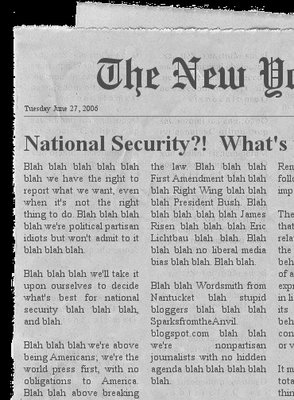The 4th Estate Again Acting as 5th Column

Bill Keller, the executive editor at the New York Times, wrote a response to the letters he's received over the Times' decision to publish the Banking Records story.
Some of the incoming mail quotes the angry words of conservative bloggers and TV or radio pundits who say that drawing attention to the government's anti-terror measures is unpatriotic and dangerous. (I could ask, if that's the case, why they are drawing so much attention to the story themselves by yelling about it on the airwaves and the Internet.)It's another slam at the "rightwing noise machine" made up of "hate radio" and "pajama-clad know-nothings".
Some comes from readers who have considered the story in question and wonder whether publishing such material is wise.The moderates, casual newspaper readers, the willfully ignorant, and the woefully misinformed (i.e., NYTimes readers, and nothing but).
And some comes from readers who are grateful for the information and think it is valuable to have a public debate about the lengths to which our government has gone in combatting the threat of terror.Id est, the Democratic Undergrounders, KosKiddies, Sheehanites, Far-Lefties, kool-aid drinkers, Hollywood Stupahdists, tin-foil hat-wearing Bush-haters, al Qaeda, etc.
I find the disclosure of this program extremely troubling, because unlike the NSA surveillance program that was initially reported on back in December, this one was flat-out self-indulgent and self-serving. What was the "noble" purpose? In the same article it admits that it appears the program is legal, that there is oversight, that Congress was briefed, and the program has been effective. So what is the purpose of reporting on this? All it does is help America's enemies.
Among the successes was the capture of a Qaeda operative, Riduan Isamuddin, better known as Hambali, believed to be the mastermind of the 2002 bombing of a Bali resort, several officials said. The Swift data identified a previously unknown figure in Southeast Asia who had financial dealings with a person suspected of being a member of Al Qaeda; that link helped locate Hambali in Thailand in 2003, they said.
In the United States, the program has provided financial data in investigations into possible domestic terrorist cells as well as inquiries of Islamic charities with suspected of having links to extremists, the officials said.
The data also helped identify a Brooklyn man who was convicted on terrorism-related charges last year, the officials said. The man, Uzair Paracha, who worked at a New York import business, aided a Qaeda operative in Pakistan by agreeing to launder $200,000 through a Karachi bank, prosecutors said.
Rich Lowry has a great opinion piece today:
The Times published a long story the other day exposing a secret government program to track the international bank transfers of terrorist suspects. The story reported that the program is legal, effective and, as far as any Bush antiterror initiative can be in the current poisonous environment, uncontroversial. Nonetheless, Keller defended its publication as “a matter of public interest.” If the program had violated laws or allowed the government to riffle through the routine banking transactions of Americans (it doesn’t on either count), Keller might have had a case. But there is nothing about the program that countervails the clear public interest in limiting terrorist financing.Isn't it obvious that the "outing" of this program by the NY Times doesn't undermine the Bush Administration, but undermines America's ability to protect itself?
Every time the press exposes a secret antiterror program, the media’s apologists shrug it off as no big deal, since terrorists already know that they are being tracked and monitored. But clearly not all terrorists knew that the U.S. was tracking cross-border transactions, say, from Saudi Arabia to Pakistan. Otherwise, the program wouldn’t have helped net a couple of major terrorist figures in Southeast Asia, or figured in terrorist prosecutions. Now they know.
On the one hand, the implicit contention of the Times is that the public almost never has an interest in secrecy, in having classified matters kept that way. On the other, it jealously guards the identity of its secret sources and wants its ability to do so in defiance of governmental investigations written into law. Here is the ultimate arrogation of public power — the Times demanding legal protection for its own secrets so it can better expose the government’s.
This attitude reflects what is, in the minds of the members of the press, an ongoing crisis of legitimacy of the U.S. government, going back to Watergate and the FBI and CIA scandals of the 1970s. It was these abuses that created the decaying, but still regnant Imperial Press, which now reflexively adopts an adversarial stance toward our government even when it is acting in an effective way, fully within its power and abusing no one. The closest the Times could come to a hint of scandal in the financial-tracking program was that “one person had been removed from the operation for conducting a search considered inappropriate.” This is hardly wiretapping Martin Luther King Jr.
Labels: media bias


















